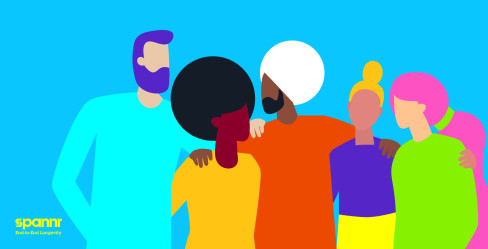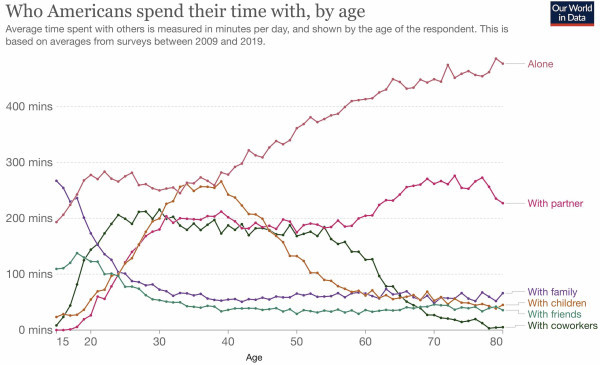Want to Live Longer? Find Your Tribe

“Loneliness kills. It’s as powerful as smoking or alcoholism.”
- Dr. Robert Waldinger
_________
The biggest thing that made me appreciate the value of community was being without one.
Having been a CrossFit gym owner and regularly working out within a community for several years, a fitness community is all I’ve ever known. Earlier this year, I started to experience some injuries and felt like I was pushing it too hard in the gym, so I decided to take some time off.
During my time off, I experimented with different fitness styles. From powerlifting to bodybuilding to Strongman, I was able to try new workout types. I enjoyed learning about new approaches to fitness, but no matter what I tried, there was something I simply couldn’t get over: I was doing it on my own.
I eventually came to the realization that more than anything, I missed the community I had when I was doing CrossFit.
It wasn’t what I was doing, it was who I was doing it with.
Shortly after, I decided to go back to my old CrossFit gym, this time refreshed and with a new sense of appreciation.
Upon stepping foot into the gym, I knew I made the right decision. I saw smiling faces I missed and I naturally fell back into my normal routine of working out, encouraging others, and receiving encouragement from others. As I interacted with other members throughout the class, I realized the value for me in the gym was primarily the community, with the exercise (and whatever fitness goals I had) being secondary.
There was a boost of emotional well-being I got from the interactions with the community that gave me more fuel than any amount of endorphins from exercise ever could.
Having this return-to-home experience made me wonder: what was the connection between being a part of a community and improved well-being, or better yet, longevity?
The Connection Between Relationships and Longevity
A Harvard study was conducted over an 80 year period, starting in 1938, tracking the health of Harvard graduates. The intention behind the study was to determine what contributed to healthy and happy lives over the course of decades, and the researchers were startled with their discoveries.
“The surprising finding is that our relationships and how happy we are in our relationships has a powerful influence on our health,” said Robert Waldinger, director of the study, a psychiatrist at Massachusetts General Hospital, and a professor of psychiatry at Harvard Medical School. “Taking care of your body is important, but tending to your relationships is a form of self-care too. That, I think, is the revelation.”
Sebastian Junger also talked about the importance of community in his book Tribe. Providing examples related to war, disaster, and tribal societies, Junger fundamentally argues that although tribal connection is mostly nonexistent in modern society, it’s this type of connection that is key to our psychological well-being and survival.
What benefits can you gain from being a part of a community (or communities)? There are several:
- Belonging
- Purpose
- Camaraderie
- Joy
- Support and encouragement
- Personal growth
- Collaboration
- Shared resources
- Motivation
- Accountability
- Greater performance (depending if the community is goal-oriented)
Now, it’s not really surprising that communities can provide us with benefits. It’s similar to sleep. We know sleep is good for us – we don’t necessarily need someone to tell us that.
What is surprising, though, is how much loneliness has become a killer in our day and age.
Loneliness as an Epidemic
The 19th and 21st Surgeon General Dr. Vivek Murthy put it best:
Loneliness is far more than just a bad feeling—it harms both individual and societal health. It is associated with a greater risk of cardiovascular disease, dementia, stroke, depression, anxiety, and premature death. The mortality impact of being socially disconnected is similar to that caused by smoking up to 15 cigarettes a day, and even greater than that associated with obesity and physical inactivity.
This study showed that there was a higher risk of dementia in a group of older adults that were in social isolation, versus the group of older adults that weren’t. As dementia is one of the leading aging-related diseases, the correlation between connection and longevity is undeniable.
Loneliness is becoming increasingly widespread among the elderly in developed countries and is projected to escalate even further over the next few decades.

Source: OWID
Defining Loneliness
Before we move forward, it’s important to delineate what loneliness is and isn’t. Loneliness isn’t assuaged by simply being in proximity to other people – when it comes to loneliness, it’s connection that’s missing.
The definition of loneliness according to The U.S. Surgeon General’s Advisory on the Healing Effects of Social Connection and Community is, “a subjective distressing experience that results from perceived isolation or inadequate meaningful connections, where inadequate refers to the discrepancy or unmet need between an individual’s preferred and actual experience.”
Or as Murthy puts it, "[You] can feel lonely even if you have a lot of people around you, because loneliness is about the quality of your connections.”
Loneliness and Mortality
In 2018, Cigna conducted a study on loneliness and discovered that most Americans consider themselves lonely. Additionally, health usually operates in a systemic way – where one facet affects another, either positively or negatively. Cigna went as far as to say, “Fueling the mental health crisis is the loneliness epidemic.”
There’s a direct correlation between loneliness and overall health, and it’s not a question of the chicken or the egg. Loneliness contributes to decreased health, and, conversely, decreased health contributes to loneliness.
Here are some key takeaways from the study that demonstrate the correlation between longevity and physical health, mental health, sleep, and exercise:
- Physical/Mental Health: People who feel good about their physical and mental health have average loneliness scores that are lower than those who rate their physical and mental health as fair or poor.
- Sleep: People who sleep the right amount of hours per night have loneliness scores lower than those who under-sleep or over-sleep.
- Exercise: The same point applies to people who exercise the right amount as well. Loneliness scores ranked highest when people didn’t exercise too much or too little.
The connection between loneliness and overall health is a self-perpetuating cycle that you can maximize to your benefit – or not.
Here are some other risk factors of loneliness:
- Living alone
- Not living near family
- Dissatisfaction with family and social life
- Long-term illness
- Disabilities
- Transportation issues
- Unemployment
- Exposure to domestic or community violence
- Social media
On the note of the last point, the reason social media contributes to loneliness is not because online connections are inherently bad, but because people choose to have online connections at the expense of in-person interactions.
On the other hand, these are the tangible benefits of socializing that not only protect against loneliness but can boost your overall health (and in turn, longevity):
- Enjoying good social support
- Experiencing meaningful daily interactions
- Being partnered
- Having low social anxiety
Discover Community… For Your Health
Finding a community is a great way to discover the social support and regular meaningful interactions you need to enhance your well-being.
What are the different types of community out there that you can find?
There are countless communities out there that you can search for to find one that fits you, but here are four major types of community:
- Fitness
- Religious
- Professional
- Intentional
Fitness Communities
I’d be remiss if I didn’t kick off this list with a homage to the type of community that reminded me of the importance of community: fitness.
Fitness communities are obviously a great way to develop your fitness (a key part of longevity), but they also provide you with meaningful connections to a group of health-minded people (insert reminder here that you’re the average of the five people you spend the most time with).
By engaging in group workouts, participating in challenges, and potentially receiving coaching from trainers, fitness community members can get motivation, accountability, and camaraderie (a sense of trust and connection that can be built by doing something difficult together).
Fitness communities generally fall under gyms, fitness groups, and online communities. Here are some examples of community-oriented gyms:
There are also some fitness groups that aren’t restricted to a specific gym or facility. Two that come to mind are Camp Gladiator and November Project. Additionally, there are countless sports-specific groups, such as local hiking, trail running, or mountain biking groups.
Lastly, here are some popular online fitness communities:
Explore the various types of fitness communities to find something that aligns with your interests and personality type.
Religious Communities
Religious communities revolve around shared spiritual beliefs and practices, and these can be found in various places of worship, such as churches, mosques, temples, synagogues, or even online. They provide people with the ability to worship, participate in religious ceremonies, share their faith with others, and engage in acts of service.
Religious communities can provide people with moral support, guidance, and a sense of belonging. Additionally, they can encourage personal growth, deepen one’s spiritual journey, and from a community vantage point, they provide a strong support network through the highs and lows of life.
Here are some examples of religious communities, not to be all-encompassing: Christian, Islamic, Jewish, Buddhist, Hindu, Sihk, and indigenous spiritual communities. These do not represent all the religious communities available throughout the world, and even within those religions, it continues to segment further into specific denominations.
You can find a religious community near you (or online) by researching and exploring groups that align with your spiritual beliefs and yearnings. Even within individual religions or denominations, you can find a number of smaller groups (e.g. Bible study groups) that can help facilitate an even stronger and tighter knit community.
Professional Communities
Professional communities can bring people together who fall in the same industry or have similar career paths. These can take the form of networking groups, masterminds, industry-specific associations, or online forums. Professional groups can provide you with an opportunity to develop your knowledge and skills, find mentorship, and collaborate with others. In being part of these groups, you can develop personally and professionally. You can also potentially find job opportunities.
The idea behind masterminds and other types of professional groups is that the cumulative wisdom of the group can help individuals achieve more success than they would on their own.
Napoleon Hill describes a mastermind in his book Think and Grow Rich as, “the coordination of knowledge and effort between two or more people who work towards a definite purpose in a spirit of harmony… No two minds ever come together without creating a third, invisible, intangible force, which may be likened to a third mind (the master mind).”
Professional communities can provide us with meaningful support when we learn from others who are experiencing similar challenges and issues.
You can find professional communities relevant for you by doing research online, attending networking events, using LinkedIn, attending meetups, or tapping into your alumni network.
Intentional Communities
Intentional communities are purposefully designed living arrangements where individuals live together and share priorities, values, and beliefs. These communities are different from conventional family-oriented households and are meant to enhance the lives of their inhabitants by imbuing them with deeper purpose, intentionality, and a profound sense of belonging.
Some examples of living communities are:
- Eco-villages: Eco-villages are communities that aim to be more socially, culturally, economically, and ecologically sustainable by having the least possible negative impact on the natural environment. They do this through the design of the living spaces and by the behavior choices residents make.
- Co-housing: Cohousing is a small community of private homes formed around a shared space, including a kitchen, dining area, and recreational areas. Neighbors typically collaborate to maintain the space, plan activities, eat meals, and help each other.
- Communes: Communes are defined by their internal economy, where residents of these communities share nearly all of their income. This type of economy gets rid of the need for participants to work in a normal job setting for pay.
- Co-ops: Cooperatives, or co-ops, are small communities of people who live in the same building and decrease cost of living expenses by sharing expenses.
You can find an intentional community near you here.
What Makes a Community Different?
Communities are different from events, hobbies, or certain group meet-ups.
With hobbies or certain meet-ups, you might occasionally do activities with others, but there’s no guarantee you’ll see them regularly or have a chance to participate within the group in a deeper way.
When it comes to combating loneliness and increasing your emotional well-being, here are the defining characteristics of a community that can make your experience more meaningful:
- Regularity: You participate in your community on a regular basis.
- Relationships: You see the same people and build rapport with them over time.
- Service: You have the opportunity to give to others and receive from them as well.
Forget biohacking and the big efforts with little pay off.
CGMs and epigenetic tests are great. Getting your heart rate into a specific zone a certain number of minutes a week is great.
But – if we’re focusing on what can deliver us the highest results with longevity, the research shows that finding our tribe (or tribes) is the way to do it. Incorporating meaningful social interaction into your life is the best way to improve your well-being.
So if you have your sleep, fitness, nutrition, and mental health dialed in, but you’re accomplishing all of this in isolation, you’re missing the largest piece to the longevity puzzle.
Find your tribe. Live longer.
You can also explore: Longevity 101: The Ultimate Guide To Increasing Your Healthspan & Lifespan
About the Author
Sign Up For Our Newsletter
Weekly insights into the future of longevity
